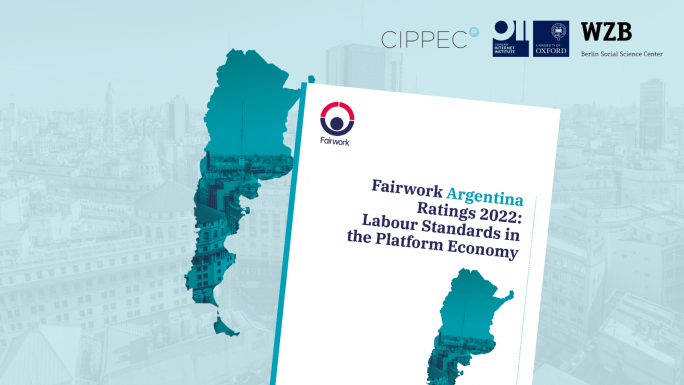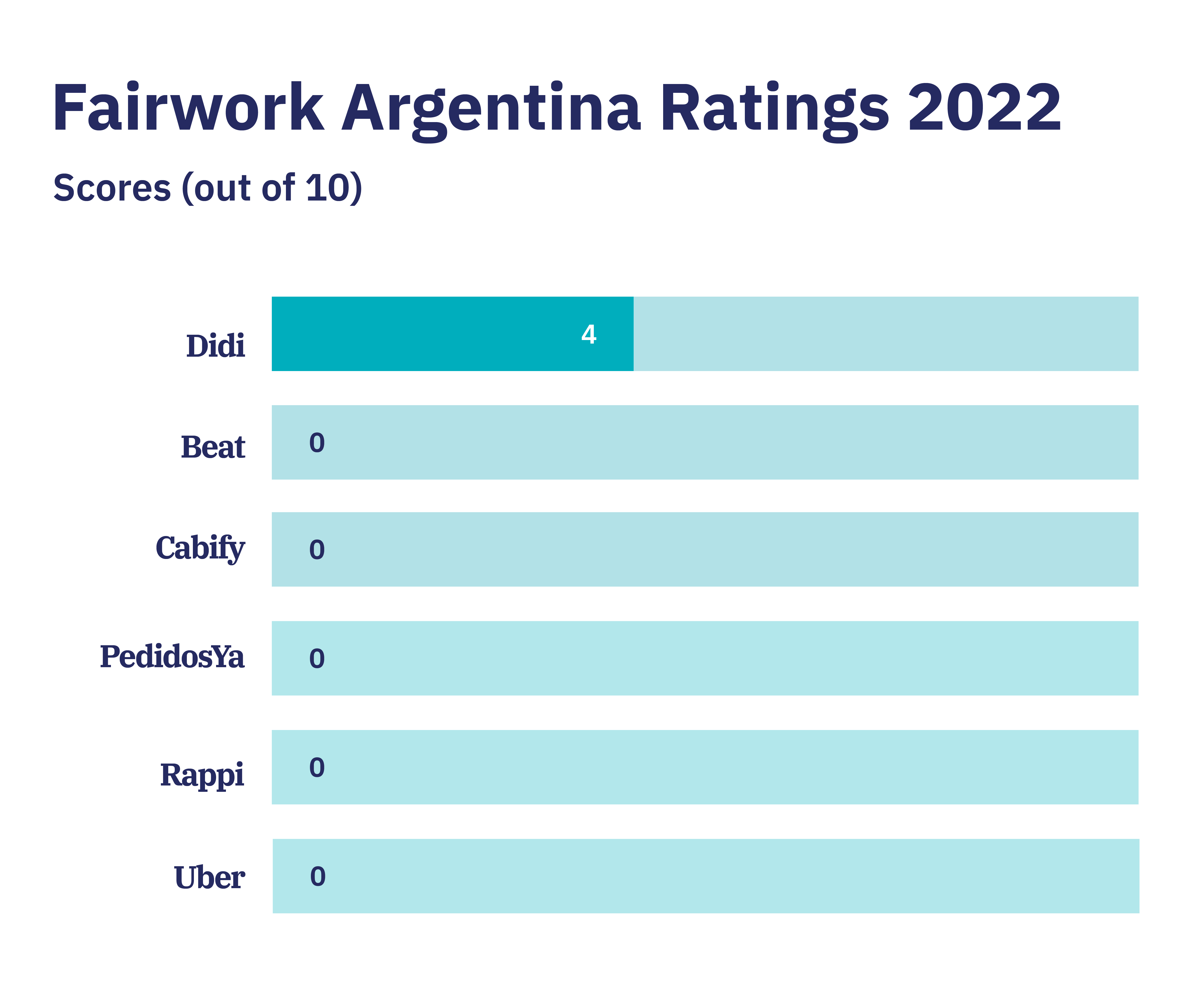Fairwork Argentina Scores 2022: New report about gig economies in Latin America

Authors: Pía Garavaglia, Julieta Haidar, Marina Benedine, Sabina Giostra, Gina Ballabén, Mark Graham, Alessio Bertolini
The ‘Fairwork Argentina Ratings 2022: Labour Standards in the Platform Economy’ report evaluates the working conditions at six of the most important delivery and ride-hailing platforms in the country (Uber, Cabify, Rappi, PedidosYa, Beat and DiDi) against five principles of fair work. The scores range from 0 to 4. Didi achieved 4 and was the only platform to achieve any points at all. These shockingly low scores indicate that the Argentinian platform economy has a long way to go before anything resembling fair working conditions are achieved.
Latin America has been at the centre of recent debates due to the conditions of workers in the platform economy and the opportunities for their improvement. Currently, the Fairwork project is present in six Latin American countries: Argentina, Chile, Colombia, Paraguay, Ecuador and Brazil. This report contains the fourth set of Fairwork ratings for the region.
Gig economies have been a big phenomenon in Argentina since before the pandemic. With low barriers to entry into the labour market, these low-skilled labour platforms have cemented their role as a practical and flexible way of generating income for workers beyond traditional ways of employment.
However, the pandemic has also increased the vulnerabilities of platform workers and has highlighted existing concerns regarding social and health protection, job insecurity and exposure to risks. The nature of platform work has also called into question the rights to organise and bargain collectively, which has been partially addressed through pioneering efforts to organise platform workers in Argentina. As a result, there is an ongoing debate about working conditions in the platform economy and the need to ensure adequate policies to ensure labour market regulation.
Platform scores have been low in this first Fairwork report in Argentina but are comparable with the scores of platforms in other Latin American countries. They demonstrate that, while creating jobs, these platforms reproduce pre-existing precarious working conditions in the region. However, the large distance between current and optimal scores leaves room for the implementation of fairer policies. For this, it is essential to continue studying the platform economy in Argentina, its dynamics, size, impacts, and working conditions, so that interventions can be made which are fruitful for all the stakeholders affected.
Ratings
Fairwork scores digital labour platforms based on five global principles of ‘fair work’ – Fair Pay, Fair Conditions, Fair Contracts, Fair Management, and Fair Representation. Evidence on whether platforms comply with these five principles was collected through desk research, interviews with workers, and platform-provided evidence. The evidence was then used to assign a Fairwork score out of ten to each platform.
Didi, the only platform to score any points at all, achieved a single first point for fair conditions by demonstrating that it mitigated some risks and a single point for fair contracts. It was also able to evidence a clear channel for workers to communicate with the platform and so also achieved a point for fair management.

Key Findings:
Fair Pay: All of the platforms failed to provide enough evidence to show that the hourly pay they offer workers is at least equal to the minimum wage after deducting costs. It should be noted that this calculation includes all connection or login hours (regardless of whether any earnings are obtained) as well as work-related costs incurred by workers, depending on the activity performed. Drivers also pay costs related to vehicle rental and accounts that substantially increase their expenses.
Fair Conditions: Workers in Argentina not only face risks from exposure to weather and traffic accidents, but also because of urban insecurity and violence, with workers regularly reporting being exposed to incidences of theft and violence. From 2020 onwards, the risk of catching COVID-19 has been added to the list.
The platforms analysed claimed they are aware of these risks and take actions to mitigate them. This includes validating profiles, monitoring rides using GPS, and providing accident insurance. However, only Didi provided evidence to support and itemise such coverage, and to show that it is effective while the driver is logged into the platform, not only during the ride.
Fair Contracts: In order to score in this principle, platforms should be able to prove that they have accessible terms and conditions, and that their content is easily readable. Furthermore, they are required to acknowledge the Argentine Republic regulatory framework and give due notice of any amendments. Only one platform (Didi) proved that it complies with these requirements.
The second point emphasises a clear definition of the employment relationship and the absence of clauses releasing the company from liability in the event of conflicts with workers. What all platforms have in common is that they all define workers as “self-employed”. However, clauses were found in all cases which show unilateral decision-making in conflict resolution processes or that release the platform from liability for negligence or inappropriate working conditions.
Fair Management: One of the things constantly highlighted by workers in our interviews with them is the lack of direct human contact as a way to communicate with platforms, as well as the arbitrary enforcement of suspensions or cancellations. Didi was the only platform to show they have a clear, accessible channel for communicating with all drivers. The operation of this channel involves receiving inquiries and appeals, and even penalised drivers have access to it. In other cases, these channels do exist, but are not available to all workers but only to those that meet certain parameters (e.g., those with the best ratings or the highest acceptance rates for orders or rides).
As regards the second threshold of this principle, only Didi was able to score because it complied with item 4.1. This company also announced they will be releasing an app feature that connects female drivers and female passengers in order to enhance their security. While other platforms also showed they have initiatives to promote equity, they failed to provide enough evidence to obtain the necessary point to be eligible for threshold 4.2.
Fair Representation: The basic point of this principle requires the existence of documented mechanisms so that workers are heard. Obtaining the advanced point requires the existence of a recognised collective body of workers that is able to conduct a representation and collective bargaining process.
Several platforms argued that they have their own forms of consultation with workers, such as surveys and group meetings, but none of them was capable of proving that communications are actually maintained with workers’ leaders or representatives, or that they recognise some form of collective organisation. This excludes Argentine platform workers from formal representation mechanisms that may enable them to negotiate their wages and working conditions. On the contrary, business decisions are usually made unilaterally. For all the above reasons, no platform scored a point for this principle.
The Fairwork Pledge
As part of Fairwork’s commitment to making platforms accountable for their labour practices, we have launched the Fairwork Pledge. This pledge aims to encourage other organisations to support decent labour practices in the platform economy, guided by the five principles of fair work.
Organisations like universities, schools, businesses, investors and charities that make use of platform labour can make a difference by supporting platforms that offer better working conditions.
Organisations have the option to sign up to the Pledge as an official Fairwork Supporter or an official Fairwork Partner. Those signing up to be a Supporter must demonstrate their support for fairer platform work publicly and provide their staff with appropriate resources to make informed decisions about what platforms to use. Becoming a Fairwork Partner entails making a public commitment to implement changes in their own internal practices, such as committing to using better-rated platforms when there is a choice.